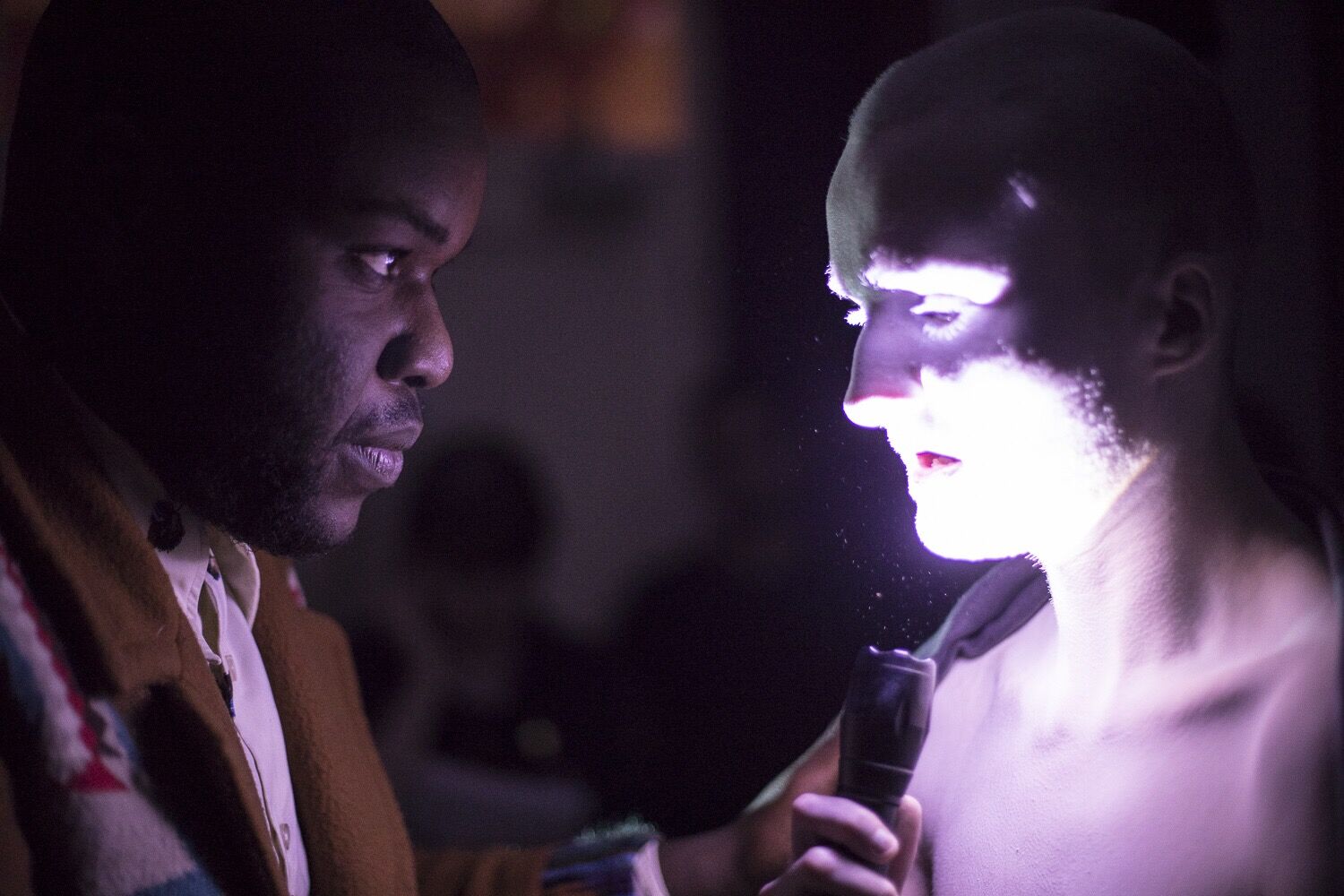Dorothy Max Prior celebrates 30 years of the David Glass Ensemble, in anticipation of their Devised Theatre Creative Retreat at The Point, Eastleigh, as part of London International Mime Festival 2020
‘Let us fail at excellence, not succeed at mediocrity.’
This is one of the bold statements on the David Glass Ensemble’s website – adding up to a manifesto, really. Here are a couple more: ‘We are not here to lecture but to reveal, seduce, delight, surprise and most of all move the audience.’ And: ‘Life is inconvenient, messy and a struggle. Let theatre reflect this and you might have an artform that has passion at its root and which ordinary people might want to see.’
The Ensemble, founded in 1990, is now celebrating its thirtieth birthday – legends in their own lifetime, and pioneers of physical and devised theatre – and if they aren’t quite as well known to the greater public as contemporaries such as Complicite, it can only be because of a certain bloody-mindedness on the part of the company’s director and leader, David Glass. He is someone who has always strived to confound fans and critics alike – to tear up the rule book, to risk failure, to take the difficult path.
He is still on that path – a path that has, in recent years, often taken him away from the rather limiting environment of the regular UK theatre scene and into new territories, literally and metaphorically. When I speak to him in late November 2019, he has just returned from Rome, and is heading off the next day to China. By January, when he lands in the UK to teach a Devised Theatre Creative Retreat at The Point in Eastleigh as part of London International Mime Festival 2020, he’ll have been to China, Hong Kong and Fiji. Oh, and to Bath where the company is based (at Bath Spa University). ’Getting around is what I do!’ says David.
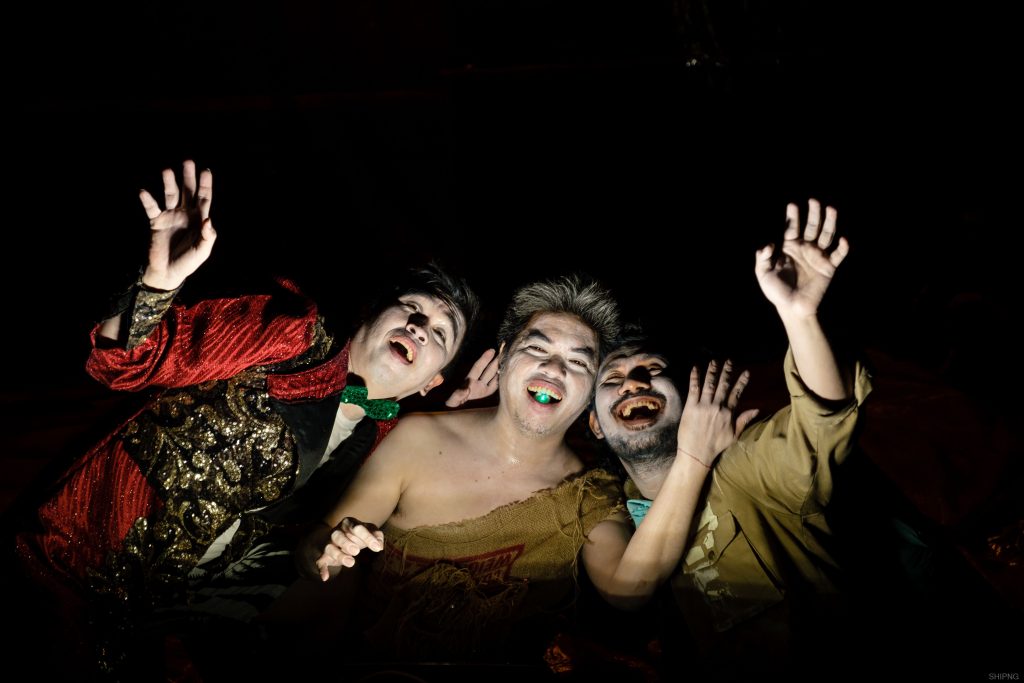
David Glass Ensemble: Tempest
And it’s not as if he’s just touring one show or project – on the contrary, he has so many things on the boil at once it is hard to even list them.
David tells me that his trip to China is to do pre-production work on Tarkovsky’s Last Days of Europe, which was developed in collaboration with Rolling Theatre of Macau and takes as its starting point three films of the great Russian film director, Andre Tarkovsky – Mirror, Nostalgia and Stalker – and Tarkovsky’s search for a ‘pure cinema.’ The piece grew out of a year-long process that David led with theatre artists in Macau, China, Hong Kong and Taiwan. It explores the themes of ‘memory, family, nostalgia and the end of culture’
Another current production, The Shining, is an immersive piece inspired by Stephen King’s novel and Stanley Kubrick’s film of the same name.
Then there’s the Ensemble’s version of Bleak House, by Charles Dickens; Tempest, after William Shakespeare, in a new adaptation by David Glass Ensemble and KL Shakespeare Players of Malaysia; Boredom: Hell – Glass’s take on part one of Dante’s The Divine Comedy, (renamed DEvine) which sells itself as ‘Rising Damp meets Natural Born Killers’ and Mortgage (part 2), with Delusion (part 3) up and coming.
But as well as the productions listed above, much of Glass’s time is dedicated to a number of ongoing projects that are more, much more, than mere theatre shows.
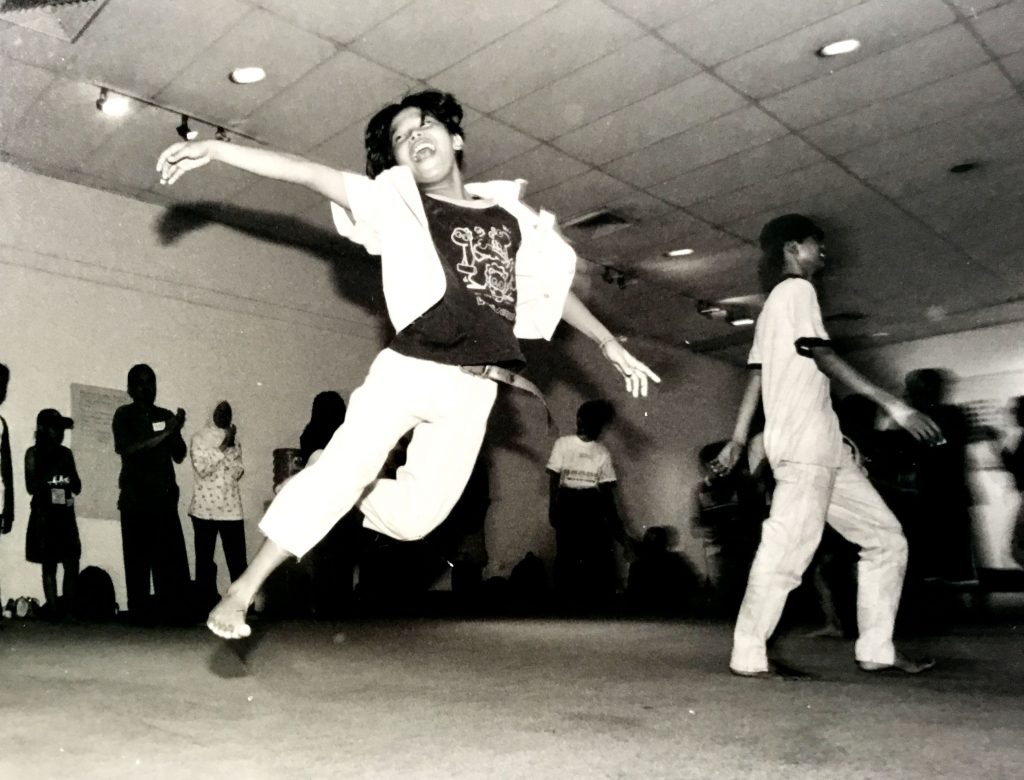
David Glass Ensemble: The Lost Child Project
The most well-known of these is The Lost Child Project, which has been running for as long as the ensemble has existed. It aims to use theatre and creative participation to give a voice to marginalised and vulnerable children and young people. The creative methodology focuses on supporting and expressing young people’s imagination through group activity in a consensual and secure environment. Training of local carers, child workers and partners in the company’s well-established techniques is key to the sustainability of the project. In an article in Total Theatre Magazine (10-1, Spring 1998), David Glass explained the start of the project:
‘I had an idea, well really two. The first was to create a company which worked together for at least a year. I’d found it was only after this amount of time that creative ensemble work became possible. The second was to explore the world of children and childhood, or more particularly lost childhood. In my years of touring abroad I had heard extraordinary stories of children surviving the most terrible traumas through the use of their imagination. These two ideas propelled me through the next year of travelling. I went to South America and Asia. I spoke to experts, care workers, NGOs and, of course, children.’
For thirty years, this project has circled the globe. In its early years, it informed the creation of theatre pieces such as The Hansel Gretel Machine, The Lost Child and The Red Thread. In more recent times, it has become something that is more about process than product. Unsurprisingly, David cites Augusto Boal as an influence – the two became friends, and one of the highly successful iterations of the project took place in Brazil, with a thousand participants. The latest manifestation of The Lost Child Project takes place in Hong Kong, where David Glass and company are working with some of the younger protestors involved in the pro-democracy movement. ‘It has become the biggest youth participation project in the world’ says David. This particular strand of the project is called The River of Ophelia, and the prevention of child suicide is a focus. The Fiji trip is also to work on a linked project.
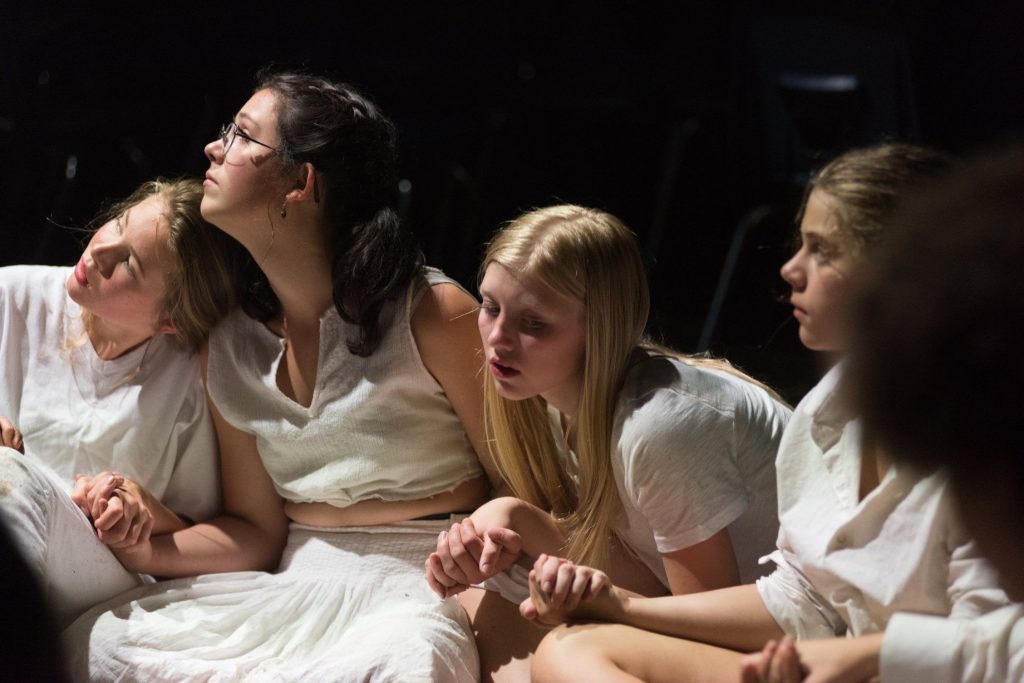
David Glass Ensemble: The AB Project
There is also now a Lost Child off-shoot called The AB Project, a three-year International Youth Arts Participation Project that takes as its focus point the horrific events of 22 July 2011, when Anders Breivik (a far-right extremist) shot dead 69 young people at a Workers Youth League summer camp on the island of Utoya in Norway. This tragic event becomes the source for positive expression and renewal. The project, which currently includes participation from nine countries across the world, embraces seminars, workshops and devising processes and in 2020 the project will culminate in an International Youth Production exploring contemporary themes of ‘political polarisation, social justice and hope’.
Not only, but also – Requiem For Change is another Ensemble project focused on contemporary concerns. It is the second iteration of a project inspired by Naomi Klein’s book This Changes Everything, and is another cross-globe collaboration – an epic devised work, mixing factual aspects of Naomi Klein’s life with fictional constructs about the titanic struggle between late-capitalism and climate change; potentially the last great story of humanity. It has been created by the David Glass Ensemble, LASALLE College of the Arts in Singapore, and East 15 Acting School in London. Sadly, David tells me, none of the major theatre venues/ institutions in the UK are interested in supporting this work – despite support for the project from Naomi Klein herself. ‘You might understand my anger about this. It goes beyond ego – I feel it is a betrayal of young people.’
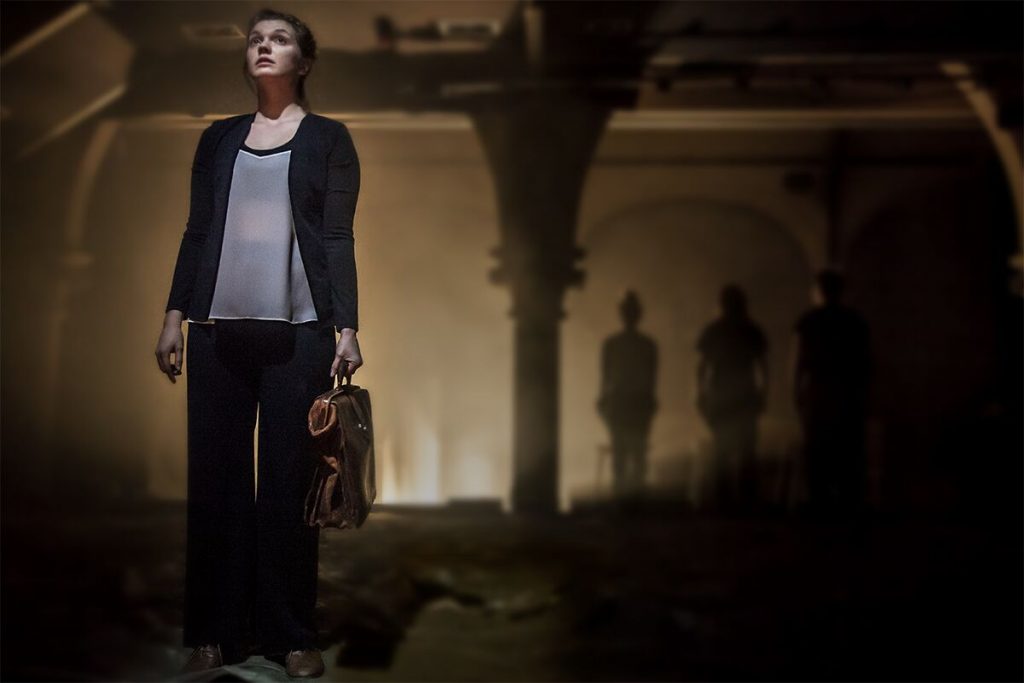
David Glass Ensemble: This Changes Everything
‘I do think boredom and anger are the great motivators for an artist!’ he says.
As you can guess from his hectic life, David Glass is someone for whom boredom is a motivating force. It was boredom that took him away from a successful career as a solo mime (which had followed on from his Paris training with both of the godfathers of modern mime, Decroux and Lecoq), with the desire to create ensemble work. ‘All I’ve ever wanted to do is fail. Fail as a solo artist, fail as an ensemble – failure is at the heart of all learning’ which I interpret as a refusal to sit back satisfied with what has been achieved, instead wanting to push forward into unchartered lands. The first David Glass Ensemble work was Popeye (1990), described by Paul Yates in a Total Theatre review as ‘a masterpiece… perfect characterisations’. The second show was Bozo’s Dead (1991) Then, in 1992, came his adaptation of Gormenghast, which he describes frankly as ‘horribly unsuccessful’ at first, although it eventually grew into something he was proud of. The seven-strong ensemble at that time included such luminaries as Peta Lily (who had also been in Popeye), Hayley Carmichael and Rae Smith.
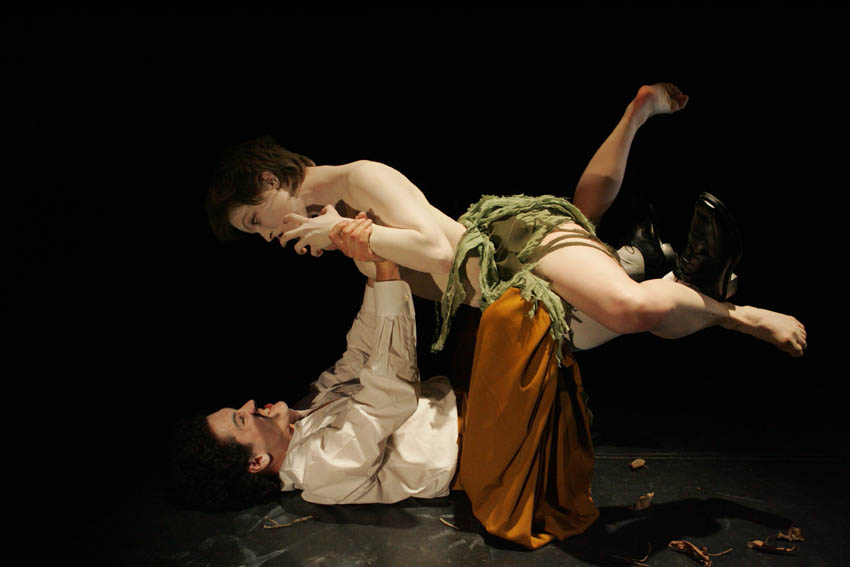
David Glass Ensemble: Gormenghast
As for that other motivator, anger, David speaks of the time (around 1996) that he ‘walked out’ on theatre – ‘boring, middle-class, theatre’ as he puts it, in order to pursue what we might, in modern parlance, call co-creation projects such as The Lost Child, which give agency to the participants. At the time, the David Glass Ensemble had just made La Dolce Vita – a show almost universally disliked by the critics, although Total Theatre’s Brendan Stapleton gave it a good review! Jo Olsen, writing in Total Theatre a year later, said: ‘La Dolce Vita is a musical about escapism that is the antithesis of escapist; it has more to do with the squalor of journalism. Although the piece was savaged by most of the critics, there was one newspaper that applauded it on every level – The News of the World. It said: ‘If you want to see how disgusting journalists are come and see La Dolce Vita.’ David Glass’ experience of La Dolce Vita was a turning point. Despite audience appreciation, the condemnation of the press made him realise how far his work had strayed from the conventions of the Establishment.’
Although he did ‘come back’ – to make work such as the Lost Child Trilogy (late 1990s) and Unheimlich Spine (2001) – David says that he still feels outside of the British theatre establishment, which is ‘more about power than telling stories’. He says that his work has often been better received outside the UK, which perhaps set up a precedent for working elsewhere. We can note that at one point he worked with Peter Brook’s Bouffes du Nord ensemble in Paris – Brook being another British theatre director who felt the need to move away.
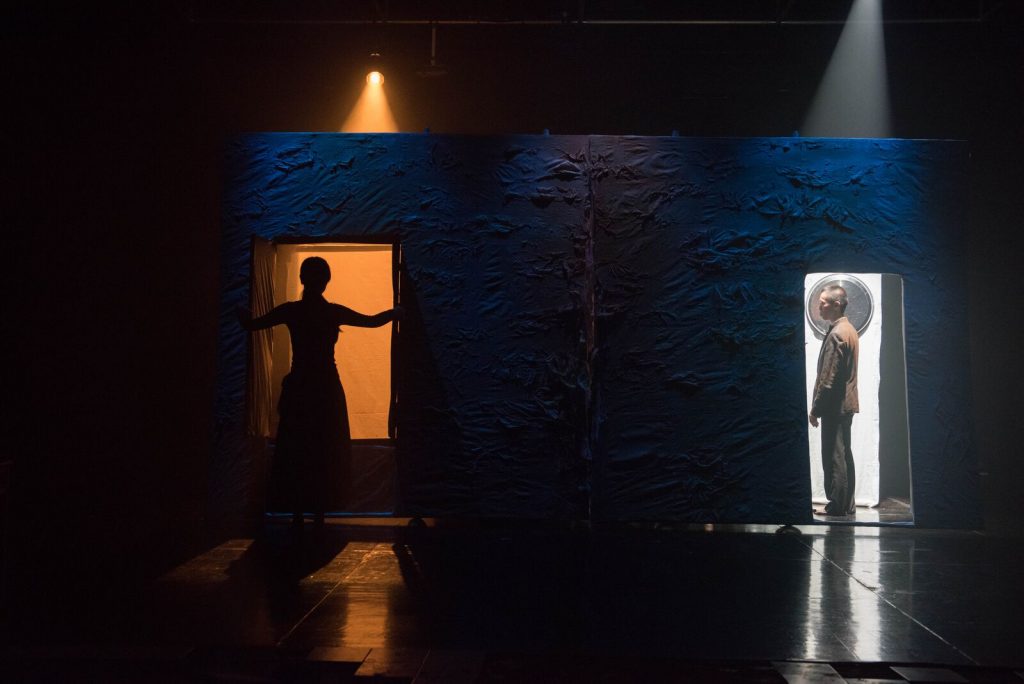
David Glass Ensemble: Tarkovsky’s Last Days of Europe
Talking of La Dolce Vita – and thinking of the current Tarkovsky and The Shining projects, as well as other film-inspired past projects such as Unheimlich Spine which is informed by horror film The Tingler, leads me to ask David about his obvious interest in cinema. So much of his work either directly references a film, or is cinematic in approach. It turns out that he grew up steeped in film. His mother was a Hollywood set designer, and he spent his formative years in LA on the film lots; but before this, his grandfather had been a film maker in Berlin: ‘He was a lost child, a street child – he worked his way up and became an assistant to Fritz Lang. And then in 1936, with the rise of Nazism, he moved to Switzerland and set up an animation studio, working with Lotte Reiniger… My mother moved to LA, so I was surrounded by film people. Then we moved to England, and I got drawn into theatre.’ He cites the influence of melodrama on works such as Gormenghast and (more recently) Bleak House – and talks of ‘the terrible sickness of naturalism and realism’ that got the upper hand in British theatre. ‘The integration of the visual element with the storytelling is always very important to me’. David also cites the influence of his scientist father – the gift from him was ‘a rigorous approach’ which has informed the development of his teaching and mentoring practices. It is interesting to note how many former students and collaborators have gone on to form renowned companies that are carrying the torch for physical and devised theatre – not least, the UK’s Gecko Theatre and Hong Kong’s Theatre Ash. Amit Lehav, artistic director of Gecko, says ‘David gave me the tools and vision for creating authentic work. I would describe my experiences in those years as my awakening and my true training in becoming an artist. David’s training is incredibly generous and deep both intellectually and experientially and for this I will be forever grateful.’ (quoted on the David Glass Ensemble website.
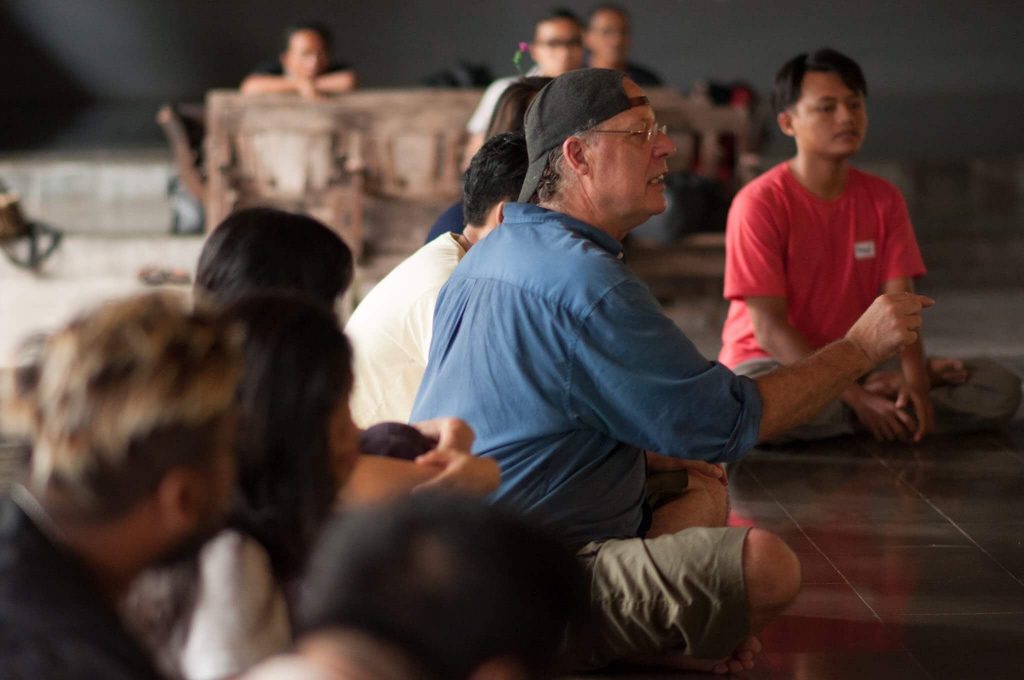
David Glass Ensemble Learning: David Glass with workshop students
David Glass has developed a five-stage Creative Practice – which participants on the week-long course for LIMF will experience. This course will be held outside London at The Point in Eastleigh, and central to the workshop will be an exploration of the performer as a holistic and collaborative maker. Participants will explore the tools of eliciting, image making, emergence, story structure and theme, to develop skills in the creation of original and authentic theatre making. ‘To be creative you have to lower judgement’ says David. ‘Give and receive rather than take and send – say “Yes and…” rather than “Yes but…”’ At this point in our conversation David says that one of the things he feels is wrong with contemporary physical and devised theatre is that it has lost the art of storytelling ‘Performers want to impress people rather than move people. Story is a fantastic way of organising a lot of complexity around a simple idea. So I teach the idea of the Holon – a Greek concept – which is something that has its own integrity, but is part of something that is bigger than itself’.’ He is also far keener on the idea of manifestation than of outcomes – ‘I’ve never seen an outcome in my life!’ he says. He also stresses the importance of reflection: ‘if you don’t reflect, you haven’t learnt very much.’
We talk a little about the shared experience of live theatre, and why this is more important than ever: “The virtual world is very convenient for keeping people apart and isolated’ he says, and talks of the loss of vocabulary in the English language of the moment and the ‘flattening’ of life, with much online commentary driven by feelings rather than reasoned thought processes. ‘The viscerality of life is everything. I love being present with the audience… we’ve forgotten how to be present with things. We don’t need belief systems to be present.’
As for the future, David Glass is very enthusiastic about a new collaboration with Julian Crouch, which will be in Siena, Italy in 2023. Artists from seven different countries will be asked to participate. ’It’ll be like a Bouffon version of the Olympics. Even at the end of time, artists will be doing mad shit. I like to imagine it as my swan song.’
It is hard to know what will become of the world in the next few years, but we can be sure that whatever is happening, vital and resourceful artists such as David Glass will be there at the frontline, challenging complacency and waving the flag for risk and experimentation. Let’s fail, fail and fail again!
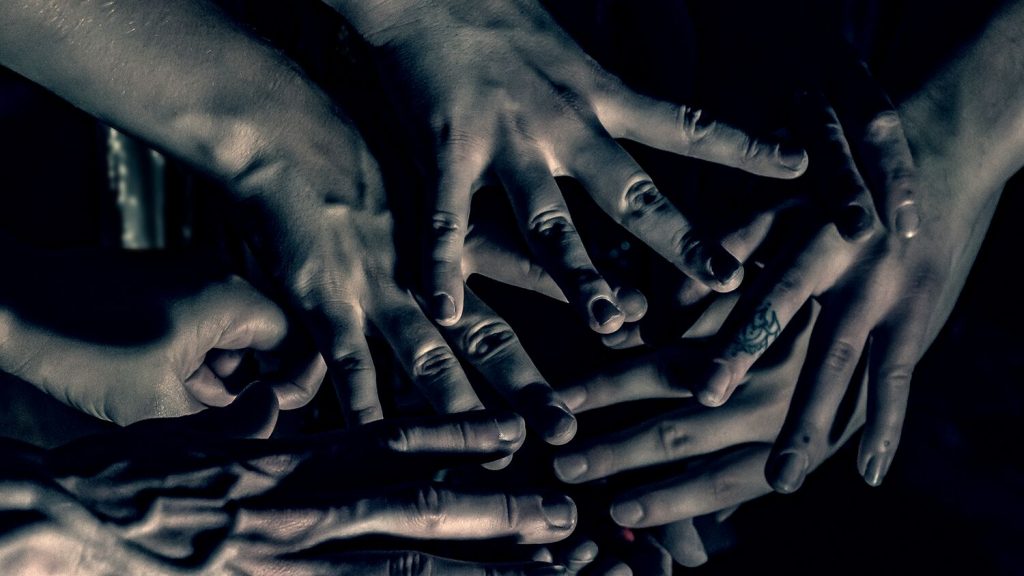
Featured image (top of page): David Glass Ensemble: The Shining.
David Glass Ensemble Learning: Devised Theatre – Creative Retreat takes place from Monday 27 – Friday 31 January 2020 at The Point, Eastleigh as part of London International Mime Festival. Details: https://www.thepointeastleigh.co.uk/whats-on/spring-2020/david-glass-ensemble,-devised-theatre-creative-retreat/
London International Mime Festival runs Wed 8 Jan – Sun 2 Feb 2020 https://mimelondon.com
For more on the David Glass Ensemble, see https://davidglassensemble.co.uk

